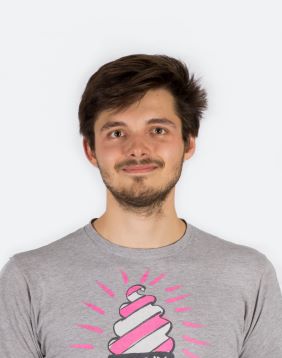Dominic Palubiski (2016 cohort)
 Please provide a brief summary of your PhD project.
Please provide a brief summary of your PhD project.
My Ph.D. focused around a diamond growth reactor. I designed and installed updates, analysed growth plasmas, and examined the diamond I grew. As well as this, I tested various diamond/epoxy nanocomposites in mechanical tests to assess how diamond origin effected material properties.
Did you choose to continue your XP project as a PhD? Why or why not?
I did choose to continue my XP project further. I greatly enjoyed the work I was doing and the supervisors I had. Plus, after discussions with my supervisors, there was plenty of interesting avenues for research still remaining.
How did the taught component benefit your PhD research?
My masters degree was in Chemistry, so the taught component not only introduced my to composites, it introduced me to engineering as a whole. While that meant lots of work in the first year, afterwards I understood a whole new field and could appreciate what exciting new research I could approach for my Ph.D.
How did the cohort structure benefit your PhD research?
Having so many other people doing their Ph.D.'s at the same time as you gives a huge amount of support. Whether in the taught year where I had plenty of friends to ask for help with certain areas, to during my Ph.D. proper where the broad range of subjects being researched made it far easier to solve problems and issues through expanded experience.
What did you most value about being part of a CDT?
The taught year. While the extra year is a big commitment, the reward of both learning a new area as well as providing the knowledge required to progress with a broad scope Ph.D. project was definitely worth it.
What was the 'impact' of your research?
My work has provided an interesting gap in the literature knowledge. Diamond nanocomposites have ignored a wide range of possible diamond sources and my work with with composites and diamond growth has provided reason to explore these sources.
What was your destination on leaving the CDT?
TBC
What are your main responsibilities?
TBC
Where do you see yourself in five to ten years' time?
From supervising masters students to managing the photographic societies darkroom, I really enjoyed work which involved organising people. I hope to be able to work with a team of people on big projects. I think I would love the organisation and planning involved.
How have the skills and knowledge you acquired during your time in the CDT helped develop your career?
There have been so many new skills that have been picked up or improved over the course of my Ph.D. The CDT provided a wide variety of 'soft skills' courses in things as broad as understanding patents to writing journal papers. Alongside this was improving my presentation ability at conferences, independent working across long experiments, organising experimental direction (helping with both general organization as well as time management), plus many more too long to list here.
